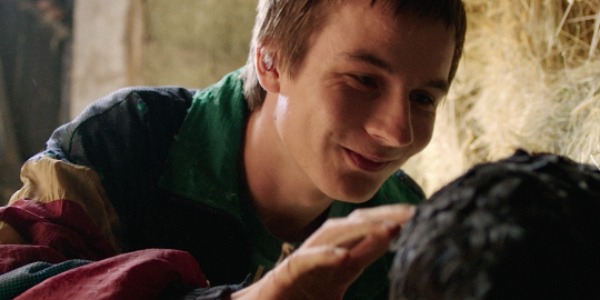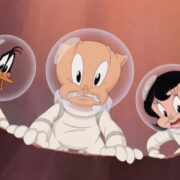CHICKEN: An Emotional Sucker-Punch

James Maitre is a writer and director based in Falmouth.…
Chicken is a British drama directed by Joe Stephenson, which debuted last year in the UK at the Edinburgh Film Festival. It follows Richard and his older brother Polly, who find themselves continuously travelling in their caravan for a place to call home. Richard, younger and more optimistic in his view, seeks stability, but Polly’s ever-increasing abusive behaviour seems to be getting the better of him.
One day, upon finding out that the electricity to their caravan has been cut, Richard meets Annabel, whose family has moved in on the land where they’re staying. As Richard’s increasing dependence becomes too much for Polly, tensions ensue over their next move and their troubled past.
Don’t Count Your Chickens Before They’ve Hatched
The film is reminiscent of many British dramas; it harks back to Ken Loach’s Kes and more recently to Shane Meadow’s fraught Dead Man’s Shoes and Clio Barnard’s The Selfish Giant. It reminds us that there seems to be an inherent nature in British cinema to tap into the ironic blight of male companionship.
These dramas, in particular, elicit the British sensibility of overt politeness in the repressed emotional states of their characters. It makes sense, therefore, that all these films are British. They focus on the darker, working-class aspects of sociology and how society tends to oppress emotion and trauma within its people.

Chicken is a great example of this; the plot is revealed subtly throughout the film, and the over-boiled states of its characters are at the forefront, making the tipping point in the final third ever more prescient. Potential spoilers ahead: it is there though, that the film stumbles (only very slightly) as it reveals its final plot point.
The film can’t help but be expositional when revealing this factor, and one does hope that, given the subtlety of the rest of the film, that this could’ve been overcome. It’s not a bad aspect by far, it’s just one that could’ve potentially been avoided in the writing process.
This Is No Yolking Matter
Amongst the whole film though, it doesn’t really matter. Chicken still packs a huge emotional sucker-punch. Its message is a simple, clear, and age old adage: don’t judge a book by its cover. The way that the plot is subtly revealed plays with expectations, and it asks you to judge these characters through their motivations.
For example, the first time we see Annabel she is cliche-ing every bit the over-privileged, middle class teenager. We assume she wants out of the scenario and that she’ll be the antagonist to Richard and Polly. Rather, she is the first to befriend Richard, and is his biggest supporter.

Richard is portrayed by Scott Chambers, who does a superb job at balancing the authenticity and eccentricities of Richard without becoming over the top, clumsy or offensive. It’s a difficult role for any actor to assume when taking on a person with a learning disability. But Chambers represents Richard with such affection and charm that credit is due. His relationship with best friend, Fiona the chicken, is adorable and sincere.
Stephenson’s treatment of Richard is admirable as well. This is not your run-of-the-mill case of poverty porn by any stretch of the imagination; these are actors and filmmakers that believe in story through authenticity. The characters of Richard, Annabel and Polly are flawed, confused, and at their core (even Polly), seeking the best for each other, whatever that may be.
The British countryside is captured beautifully here, despite the low-budget production of the film. Ebon Bolter, the film’s Director of Photography, doesn’t spare its celebration of warm meadows and babbling brooks. This is as much a proliferation of the country as it is of the people within it.
Conclusion
Chicken is a really strong British drama and an impressive debut from Joe Stephenson. Stephenson has already signed onto his next film, starring no less than Ian McKellen and Vanessa Redgrave. In Chicken, he’s managed to craft a film which subtly draws you in, probing you to ask questions of its characters. Despite clear references to British cinema history, Stephenson does plenty with the film to set itself apart.
The central performances are exceptionally strong from its young cast, and its low-budget production is not at any expense of the cinematography. The film looks great; it celebrates the British countryside whilst highlighting the inherent realism that occupies it. Chicken is a story of people and judgement, and it is a film that should be judged as a winner.
Will you watch this golden egg?
Chicken has recently finished a stint on streaming platform MUBI, and is in select UK Cinemas throughout the country. Find international release dates here.
Does content like this matter to you?
Become a Member and support film journalism. Unlock access to all of Film Inquiry`s great articles. Join a community of like-minded readers who are passionate about cinema - get access to our private members Network, give back to independent filmmakers, and more.
James Maitre is a writer and director based in Falmouth. He has worked on numerous short films and screenplays during his time at University. James also ran the Falmouth Film Society during his studies, as its president for the academic year 2014/2015, this subsequently led to an award nomination for its improvements at the FXU Awards. Now graduated, James regularly podcasts and is pursuing a career in Film Writing, Exhibition and Filmmaking.













